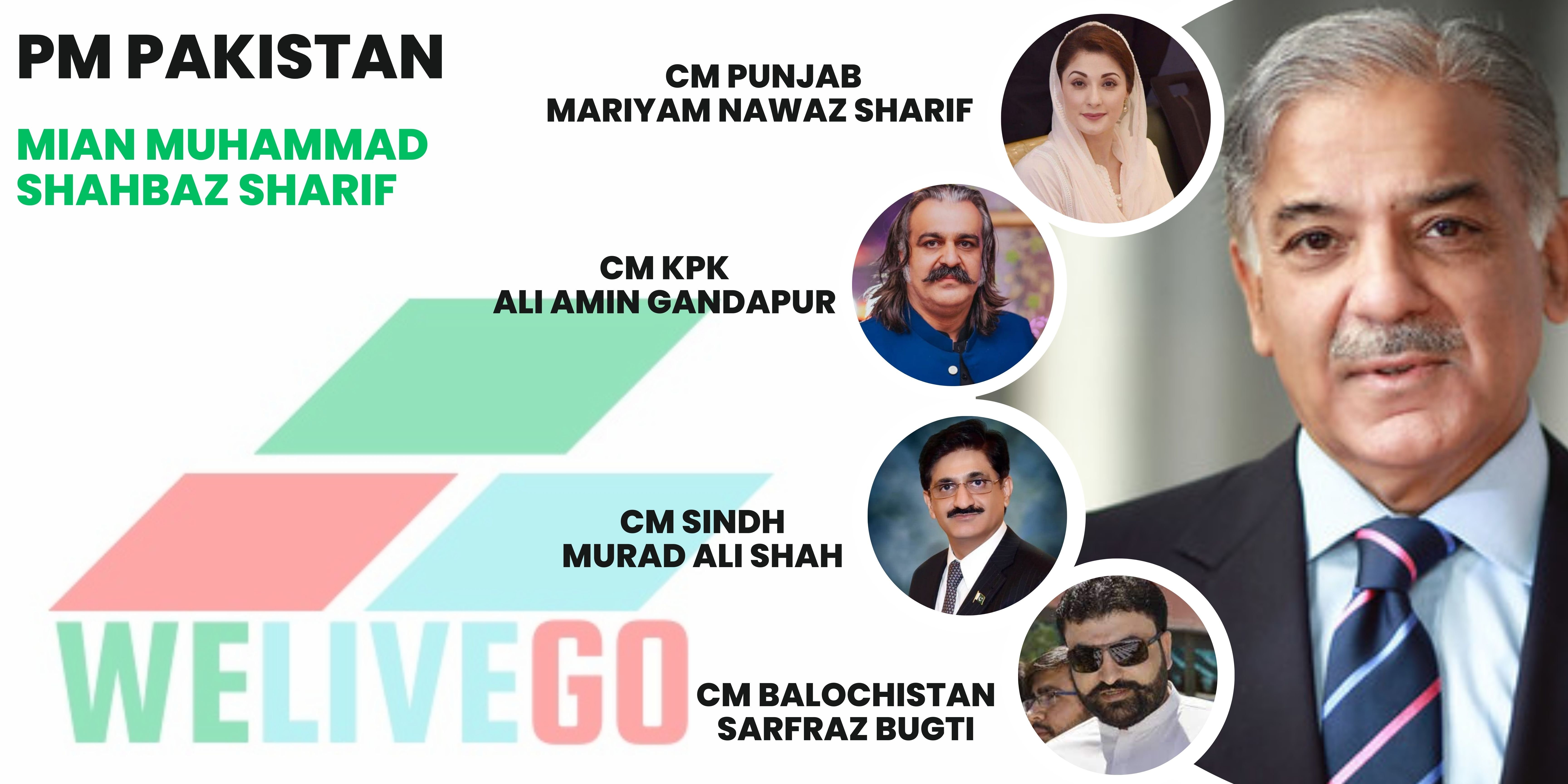Pakistan General Elections 2024 Updates
Who will be the next prime minister of Pakistan in 2024?
Pakistan Elections 2024: Live Updates
Leading Party Position for Pakistan Election 2024
| Political Party Name | National Assembly Seats | Punjab Assembly Seats | Sindh Assembly Seats | KPK Assembly Seats | Balochistan Assembly Seats |
|
IND (PTI) |
92 | 116 | 11 | 79 | -- |
| PML-N | 79 | 138 | -- | 5 | 9 |
| PPP | 54 | 10 | 83 | 4 | 11 |
| PML | 3 | 7 | -- | -- | -- |
| TLP | -- | 1 | -- | -- | -- |
| IPP | 2 | 1 | -- | -- | -- |
| PML-Z | -- | 1 | -- | -- | -- |
| IND | 5 | 22 | 3 | 7 | 5 |
| MQM-P | 17 | -- | 27 | -- | -- |
| JUI-F | 4 | -- | 1 | 7 | 8 |
| BNP | 2 | -- | -- | -- | -- |
| GDA | -- | -- | 3 | -- | -- |
| JIP | -- | -- | 2 | 3 | 1 |
| PTI-P | -- | -- | -- | 2 | -- |
| ANP | -- | -- | -- | 1 | 2 |
| BAP | -- | -- | -- | -- | 4 |
- HRCP requests that internet services be restored immediately.
- A fight involving political workers in Kot Addu, Punjab, left 15 injured.
- Four injured in Chakwal incident
- Voting is done by PPP co-chairman Asif Ali Zardari.
- At the central control center, CEC Sikandar Raja keeps an eye on the electoral process.
- Voting has not yet begun at a polling place in NA-238, Karachi.
- Aseefa Bhutto-Zardari, the head of the PPP, exercises her franchise.
- Vote is cast by PML-N chief Nawaz Sharif.
- PPP pushes ECP to oppose cellphone and internet restrictions
- The internet is not our mandate, according to CEC Raja.
- Drivers and watchmen designated as presiding officials accuse Hafiz Naeem
- Voting is done by President Arif Ali
- Voting by a Punjab minister is prohibited without a CNIC
- Chief of Sindh Rangers tours around Karachi
- Brad Sherman: The United States backs free and fair elections in Pakistan
- Services for mobile phones must be reinstated right away: Bilawal
- The ECP system is not internet-dependent: CEC Raja
- Iran and Afghanistan border crossings will be blocked
- Murtaza Solangi exhorts individuals to vote
- Former chief minister of Sindh, Murad Ali Shah, votes in Sehwan
- NA-130 polling places experienced delays due to agent absences.
- PPP leader Bilawal Bhutto Zardari has demanded that mobile phone service be restored "immediately" throughout the nation.
-
Nationwide general election polling for 2024 has now begun.
-
Up to 90,675 voting places have been set up nationwide.
-
In all, 128 million people are eligible to vote in the nation.
-
Pakistani government suspends cellular communications nationwide
Pakistan will hold general elections on February 8, 2024, to choose the members of the 16th National Assembly. On December 15, 2023, the Pakistani Election Commission released the full schedule.
The Pakistan Peoples Party (PPP), led by former foreign minister Bilawal Bhutto Zardari, and the Pakistan Muslim League (N) (PML-N), led by former prime minister Nawaz Sharif, are the two main political parties. The largest party in the previous elections, Pakistan Tehreek-e-Insaf, is running candidates as Independents in the wake of a contentious Supreme Court decision that cost them their electoral emblem just before the polls.
Background
On Wednesday, July 25, 2018, Pakistan held general elections following the conclusion of the outgoing government's five-year tenure. Elections were conducted nationwide in 272 seats, with one member of the National Assembly being chosen from each. To choose members of the Provincial Assemblies (MPA), elections were conducted in each of the four provinces at the provincial level.
Following the elections, the Pakistan Tehreek-e-Insaf (PTI) emerged as the dominant national party in terms of both seats and popular vote. At the provincial level, the Pakistan Peoples Party (PPP) continued to lead Sindh, the PTI held the lead in Khyber Pakhtunkhwa (KP), and the newly established Balochistan Awami Party (BAP) emerged as the leading party in Balochistan. The Pakistan Muslim League (N) (PML-N) narrowly emerged as the largest party in terms of directly elected seats in Punjab's hung parliament. However, the PTI grew to become the largest party and was able to establish the government after receiving backing from the Pakistan Muslim League (Q) and independent MPAs joining the party.
Conflict Over The Schedule
The PDM government passed a statute at the beginning of May 2023 that permits the filing of review petitions against earlier Supreme Court decisions. Another rule that set a five-year disqualification period was passed at the end of June. Additionally, it permits the electoral commission to declare an election's date without first consulting the nation's president.
On November 19, 2019, former Prime Minister Nawaz Sharif departed the nation for medical treatment in London, having completed 12 months of his 7-year sentence stemming from accusations of corruption. He had promised to return in 4 weeks. He was listed as a fugitive in 2021 after he ignored summonses to appear in court. On October 19, 2023, Sharif was granted protective bail, allowing him to leave his self-imposed four-year exile without being taken into custody. He returned to the nation on October 21 and was greeted by tens of thousands of his admirers in Lahore.
In a review petition against lifetime disqualification, the 7-member Supreme Court bench led by Chief Justice Qazi Faez Isa announced a 6-1 majority decision on January 9, 2024, with Justice Yahya Afridi dissenting. The Supreme Court's previous interpretation of lifetime disqualification under Article 62(1)(f) of the Constitution was overturned in the verdict, which found that it violated fundamental rights. Instead, a 5-year disqualification under the recently passed laws was imposed on legislators who do not uphold the moral standard of "sadiq and ameen" (honest and righteous). The timing of the ruling guaranteed Sharif's eligibility to run for these elections and potentially win a fourth term as prime minister after being found guilty in the 2017 Panama Papers case and being disqualified for life.
PTI is Actually Under Ban Due to an Internal Party Election Decision
The Election Commission of Pakistan (ECP) made the decision on December 22, 2023, to deny the PTI the right to retain its electoral symbol. The ECP cited the party's inability to successfully hold intra-party elections. The PTI then filed an appeal with the Peshawar High Court (PHC) on the same day, contesting the ECP's ruling. Consequently, the ECP's order was put on hold until January 9, 2024, by a one-member bench. The ECP sent the PHC a review application on December 30, 2023. A two-member panel heard the case and removed the suspension order in the ensuing days.
But on January 10, 2024, the two-member court declared the ECP's order to be "illegal, without any lawful authority, and of no legal effect." before response, the ECP challenged the decision before the Supreme Court on January 11. On January 13, a three-judge panel led by Chief Justice Isa sided with the ECP, upholding their earlier ruling to refuse the PTI its election symbol—the cricket bat—because the party had not carried out intra-party elections as required by the party's constitution. As a result, none of the PTI's candidates received party tickets, and as a result, each party's candidates are now listed as independents with unique electoral emblems. Additionally, the party was deprived of its ability to propose candidates for the 226 reserved seats in the national and local councils. Some legal experts have characterized the SCP's judgment as a "huge blow to fundamental rights" and "a defeat for democratic norms."
Pakistan Election 2024 Schedule
On December 15, 2023, the Pakistani Election Commission released the election timetable.
|
Sr no |
Poll Event |
Schedule |
|
1 |
Notice to the Public from the Returning Officers |
19-Dec-23 |
|
2 |
Dates on which candidates submitted their nomination papers to the returning officers |
20 December 2023 to 24 December 2023 |
|
3 |
Release of the candidates' names who have been nominated. |
24-Dec-23 |
|
4 |
The last day for the Returning Officer to review nomination documents |
25 December 2023 to 30 December 2023 |
|
5 |
The deadline for appealing a return officer's decision to accept or reject nomination papers. |
03-Jan-24 |
|
6 |
The deadline within which the Appellate Tribunal must decide appeals |
10-Jan-24 |
|
7 |
Release of the updated candidate roster |
11-Jan-24 |
|
8 |
The deadline for withdrawing from consideration and publishing the updated list of applicants |
12-Jan-24 |
|
9 |
Giving election symbols to candidates in competition |
13-Jan-24 |
|
10 |
Date of Voter Registration and Counting |
08-Feb-24 |
The parties that either had representation in the 15th National Assembly of Pakistan or obtained a vote share greater than 0.5% in the 2018 Pakistan general election are listed in the table below. In the 2018 elections, political parties are ranked according to their vote share. 2018 saw 13 national assembly seats (both general seats and total seats in the 15th National Assembly, as reserved seats for women and minorities are awarded to political parties) won by independent candidates, who received 11.46% of the vote.
|
Parties |
Leader |
Vote share |
General seats won in 2018 |
Seats before election |
|
|
in 2018 |
|||||
|
PTI |
Imran Khan |
31.82% |
116 / 272 |
149 / 342 |
|
|
PML(N) |
Nawaz Sharif |
24.35% |
64 / 272 |
82 / 342 |
|
|
PPP |
Bilawal Bhutto Zardari |
13.03% |
43 / 272 |
58 / 342 |
|
|
JUI-F |
Jamiat Ulema-e-Islam (Fazl) |
Fazl-ur-Rahman |
4.85% |
11 / 272 |
14 / 342 |
|
JI |
Jamaat-e-Islami Pakistan |
Siraj-ul-Haq |
4.85% |
1 / 272 |
1 / 342 |
|
MQM(P) |
Muttahida Qaumi Movement – Pakistan |
Khalid Maqbool Siddiqui |
1.38% |
6 / 272 |
7 / 342 |
|
TLP |
Tehreek-e-Labbaik Pakistan |
Saad Hussain Rizvi |
4.21% |
0 / 272 |
0 / 342 |
|
GDA |
Grand Democratic Alliance |
Pir of Pagaro VIII |
2.37% |
2 / 272 |
3 / 342 |
|
ANP |
Awami National Party |
Asfandyar Wali Khan |
1.54% |
1 / 272 |
1 / 342 |
|
PML(Q) |
Pakistan Muslim League (Quaid e Azam) |
Shujaat Hussain |
0.97% |
4 / 272 |
5 / 342 |
|
BAP |
Balochistan Awami Party |
Khalid Hussain Magsi |
0.60% |
4 / 272 |
5 / 342 |
|
BNP(M) |
Balochistan National Party (Mengal) |
Akhtar Mengal |
0.45% |
3 / 272 |
4 / 342 |
|
AML |
Awami Muslim League Pakistan |
Shaikh Rasheed Ahmad |
0.22% |
1 / 272 |
1 / 342 |
|
JWP |
Jamhoori Wattan Party |
Shahzain Bugti |
0.04% |
1 / 272 |
1 / 342 |





Leave A Comment